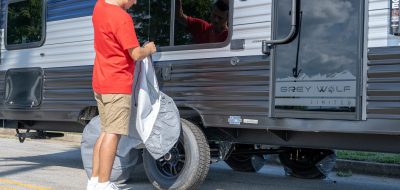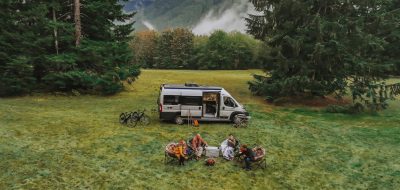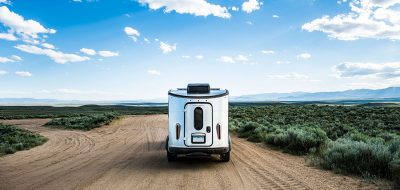This past Labor day I was camping with my girl friend and children. We were too late to get into the regular State Forest campground that we like to stay at and were demoted to “dispersed” camping. These are unimproved campsites in a general area. The campsite we picked out of the three we found was very steep, but, after 4 tries, we managed to find a spot for the camper. Night one was uneventful. But the second night we had an uninvited visitor … a Black Bear.
Now, Pam, my designated co planner for camping trips, was a little worried when she heard it and woke me (it generally takes a small to medium-sized explosion to wake me, my snores tend to drown other noises out!). After I quit rubbing my ribs and could breathe, I listened and said yes it could be a bear. When ask what I was going to do, I realized this was a man thing (you know killing spiders, taking out the garbage and chasing off bears). So, I walked over to the door and turned the outside light on and saw… A Bear! To be honest, I thought I would see a raccoon or deer or something smaller. I don’t know who was more surprised, the bear or myself. In the End, the bear was easy to chase off; he turned and ran, and I stuck my head out the door and yelled at him just to make it look good, and he never came back.
Then three days later, I was driving a back road going to look at a house that was for sale and had a mother bear with two cubs on the road in front of me. Mother and one cub went to the right and one cub went to the left. So, for the next few minutes, I sat between them in my truck and watched until they figured out I wasn’t going to hurt them. Finally, the lone cub crossed the road and ran to Mom and all three left, not to be seen again.
Now, what do these two events have in common? Obviously the bear contacts. My step-father couldn’t believe I had seen 4 bear in less than a week and proclaimed I was as lucky as a dog with two… well, never mind. But the fact is most people don’t see bears that often and don’t know what to to when they do see them. Many of them have watched too many Disney movies and think bears are some sort of cuddly animal or have watched too many horror movies and think they are about to die. The truth lies somewhere in the middle of course.
So let me give you some Bare facts about Bears:
- If you are going to be attacked, it most likely will be a black bear. Why, you ask? Well, they are in almost every state, grizzly bears have a very limited range.
- Most people that are attacked have done something, shall we say less than intelligent, like tried to have their child feed the nice bear some marshmallows or gotten between a mother and her cubs.
- Bears like food and if you feed them they will come; however, if you quit feeding them, they will still come and now will be hungry and used to humans. (this is called a campground where everyone leaves their coolers out until the bears are used to eating out of coolers). Leaving food out on the table and going away is just asking for bear problems.
- Only ONE campground in Yellowstone is closed to tents and soft side campers, and that is Fishing Bridge Campground.
- A single hiker moving quietly is more likely to have problems with bears.
- Bears do have comfort zones. So, if you get too close to them and invade that space, they will try to leave. If you have left them no easy exit, they will leave over you.
- Bear spray will work to keep them away but even better than that is to be smart.
So, what can you do to protect yourself and your loved ones from bears? Mostly, it is very easy.
- Stay in your vehicle if you see a bear. Stop and take that picture, but, unless the bear is over a hundred yards away, you are safer in the vehicle. The same for a camper… don’t go out and try to scare them off, stay inside.
- Lights and loud noises will work to scare all but the most persistent of bears off. Loud whistles, banging on pots, yelling, honking your horn.
- Don’t feed the bears. Keep all food and containers in your camper (or vehicle) or in the bear boxes. If you are backpacking, suspend the packs on a rope between two trees well out of reach from the trees or ground.
- When hiking, go as a group and don’t be afraid to make noise in bear country — sing, talk, wear bells. Stay close together and, if you see a bear, bunch up. Three or four people all together look bigger and tougher than one alone.
- Don’t try to get too close to a bear … they are wild animals, and, if you try to feed them, whatever happens to you, you deserve.
- Whatever you do, DON”T get between a mother bear and its cub or cubs. If you find yourself between a mother bear and her cubs, leave as quickly and quietly as you can.
- If you are attacked, try to cover your head with your arms and do the proverbial play dead act.
- They say black bear can climb trees and grizzly bears can’t. Mostly true, grizzlies just push them over; so, don’t rely on trees to save you. Plan ahead and be smart.
Bears are an exciting part of the outdoors. Treat them with respect and intelligence. Binoculars and spotting scopes are the best things for bear watching. Seeing a bear in the wild can make a memory you will treasure forever, like when we saw a Grizzly with three cubs in Yellowstone.
And I’m just going to leave you with one thought: Good bears poop has nuts and berries in it. Bad bears poop has bells and whistles in it and smells like pepper. (Smile)
Your Obedient Servant,
Gary Smith, Jr.








Pingback: how to make a website
gluttButInfulky
hello it is test. WinRAR provides the full RAR and ZIP file support, can decompress CAB, GZIP, ACE and other archive formats.
dkjtgvziiqfltnlovdfrwobsaoyiisyqkkyhello
Gary Smith, Jr.
Ok after some more research I do have to agree with the fact that with black bears you might be better off fighting them, than playing dead. To be honest I think it may have to do with how used to people the bears are.
And yes some of this is common sense, but in a world where they take Kindergartener’s hair barrettes away from her because tinkerbell’s wings could be used as a weapon, I don’t think there is any common sense any more.
And perhaps the most important thing that I forgot is as “jjtotten” said: “A fed bear is a dead bear”. That is so true, they are no longer as afraid of people, have come to depend on human food and loose their natural behavior and become very dangerous!
And by the way I have seen bears run/climb trees and yes they can go up the right sized tree faster than most people can run on flat level ground. So be aware.
Thank you all for your wonderful comments!
Your Obedient Servant,
Gary Smith, Jr.
Mark
I agree with the previous poster, Bob. Everything I have read and heard about bear encounters is that if the bear comes towards and trying to be big, making noise fails, with a grizzly, lay on your belly, put your hands over the back of your neck. With a Black bear, fight, fight, fight, go for the eyes, the nose anything, but do not play dead.
My website is link has a lot of pictures of bears from Haines Alaska this past August.
This video from Backpacker magazine is very informative about bear attacks.
http://backpacker.com/survival_skills_survive_a_bear_attack/videos/40
cheers, Mark in Montreal
Bob
One clarification … Experts generally say that if attacked by a grizzly or brown bear, to play dead as suggested in your blog. However, the recommended response to a black bear attack is to fight back by yelling (screaming if you prefer), striking at the bear’s head, throwing rocks or whatever. A black bear doesn’t mind eating dead things, including someone playing dead.
Jim Burnett
Lots of good advice here – thanks for sharing it!
You hit on the keys, including keeping a safe distance, proper storage of food, and avoiding surprising a bear. Yes, making noise reduces your chance of seeing wildlife, but also greatly reduces the risk of a bear encounter.
One clarification about bear pepper spray – it is a proven defensive measure, but not a “repellent” – bear pepper spray should only be used if a bear attack is imminent. It’s essential not to confuse bear pepper spray with the personal defense spray (“mace”) some people carry as a defense against human threats – the products are NOT the same, and the differences are critical if you use it against a bear.
You’ll find more details on bear safety and bear pepper spray at http://www.squidoo.com/bearattack.
jjtotten
Good advice about bears. Recently in Alaska we had an interesting experience that completely changed my mind about getting in a tree to get away from a bear. Granted some of them cannot climb a tree, but most of them can. We were camped on Elmandorf Air Base and a bear that was about three years old came into the campground. Of course it did, it was born on the base and had been living out of the food that that campers and base personnel left out that it could get into. At any rate the ranger had been watching it and decided that they needed to make sure that it did not hurt any of the campers. It was about 10:30 PM, not dark though, when several people went running through the camp as we were returning from our shower. The bear was in a grove of trees and ran into an open field which had one lone tree in the middle of it. The bear headed for the tree and literally ran about 30 feet up the tree before stopping. I hope that I can get across that the bear did not climb up the tree it ran up the tree, probably faster than I can run on level ground. It would have done no good to try to out climb the bear to get away. In the end the bear was killed as it was not afraid of people and was just living off the fat of the land. We asked the ranger why they killed it and were informed that they could have darted it and hauled it a couple of hundred miles away and it would have been back in a week so that was not the solution. The solution, he said, was don’t feed the bears as “A fed bear is a dead bear.” We like to watch them too, from a distance and often wonder what if anything people are thinking when they get close to these beatiful wild critters.
John Jackman
Bears can be a nusiance or they can be a pleasure to observe. Use common sense as they are wild animals and they can demonstrate this very quickly.
Banging on pots and honking horns do nothing to a bear that has been aclimatized to human contact.
Most of the time when you see a bear it will be a fleeting glance at a dark object moving quickly away from you.
A friend of mine hit a bear at about 60 miles per hour a glancing blow that did about $1500 damage to his car. He went back to see the bear after he stopped down the road about 3/4 of a mile down. The bear was gone.
Just be cautious and careful..
Rick
I like to see wildlife too. I don’t like walking up on a 600lb Grizzly that doesn’t know I’m there. Too much bear for that and I would rather not see one than see one like that.
Royce Wyrick
By and large, I agree with you. Most of what you list seems to be “common sense”. I like your last thought ie. “has bells and whistles in it and smells like pepper.”
However, I am uncomfortable with the idea of making noise. I believe that doing so will allow a bear to leave the area and that you would never see him. I think maybe that excessive noise will also alert deer, elk, coyotes, wolves, hawks, robbins, wood peckers, rabbits, fox, quail, etc. and with simular results.
Whereas, I have no desire to wrestle with a bear, I enjoy seeing wildlife from time to time therefore, I am not comfortable with the “being noisy:” concept.
Also, in line with the “has bells and whistles in it and smells like pepper.” – suggests that wearing bells is an avertisement that “dinner is served”,